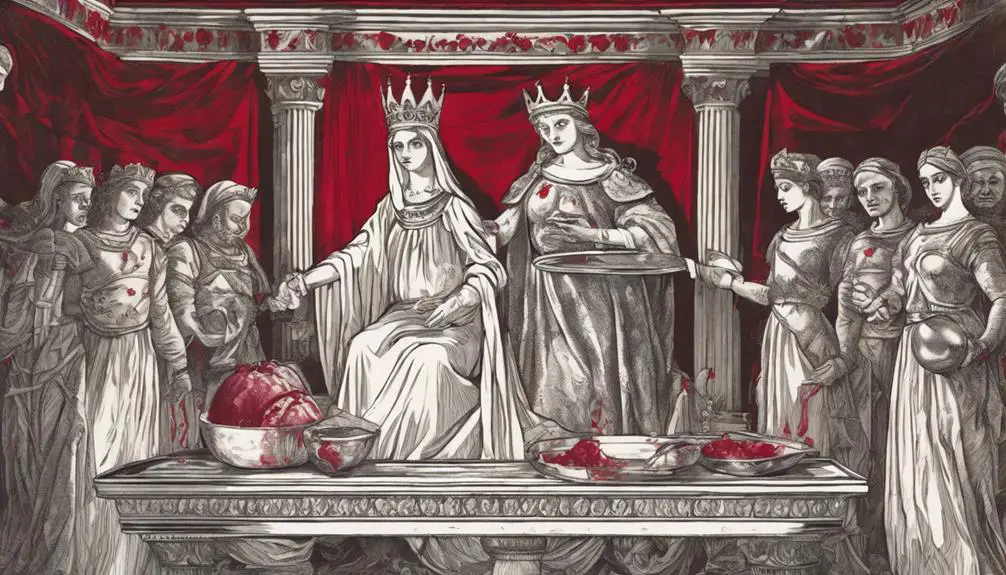Intriguing tales of biblical mothers whose questionable actions ignited controversy; delve deeper to challenge your understanding.

Bad Mothers in the Bible
Consider Eve, the first mother in the Bible, who succumbed to temptation and led humanity into original sin. While her actions set a precedent that has been debated for centuries, she's not the only mother in biblical accounts who's done questionable things.
From Sarah's jealous wrath to Jezebel's manipulation, numerous examples exist that can stir up a heated discussion. Don't you want to explore these intriguing examples further and perhaps challenge some long-held beliefs?
Key Takeaways
- Biblical narratives caution against disobedience and temptation, as illustrated by Eve's fall from grace.
- Impulsive decisions and jealousy, as seen in Sarah's story, can lead to irreversible familial consequences.
- The destructive outcomes of manipulation and revenge are highlighted in Herodias' plot against John the Baptist.
- The stories of Athaliah and Jezebel illustrate the dangers of unrestrained ambition and manipulation, leading to downfall and spiritual disorder.
Eve: The Original Sin

Diving into the heart of biblical narratives, you'll encounter Eve, the first mother whose disobedience marked the inception of 'The Original Sin'. As the story goes, Eve's temptation by the serpent in the Garden of Eden led to her sampling the forbidden fruit, an act that resulted in mankind's fall from divine grace.
Her actions, driven by curiosity and desire, resulted in significant original sin consequences that have resonated throughout history. Eve's transgression introduced death, suffering, and the inherent sinful nature of humanity into the world. While the fruit offered the promise of knowledge, it came at the cost of innocence and eternal life.
Analyzing Eve's disobedience, it's clear that her actions set the stage for the recurring theme of disobedience and its consequences in biblical narratives. As the progenitor of all mankind, Eve's narrative serves as a universal cautionary tale about the dangers of succumbing to temptation and the severe consequences that can result from a single act of disobedience.
Sarah's Jealous Wrath

Turning the pages of biblical history, you'll meet Sarah, whose jealousy and wrath paint another portrait of a flawed motherhood. Sarah's story is one of a desperate mother who, in her impatience, made decisions that had dire consequences.
- Sarah's Impatience: Sarah, unable to bear children, gave her servant Hagar to her husband, Abraham, to bear a child. The birth of Ishmael was supposed to solve her problem, but it only fueled Sarah's jealousy.
- Sibling Rivalry Consequences: Sarah's jealousy intensified when her miracle son Isaac was born. The rivalry between Isaac and Ishmael, Sarah's own initiation, led to a family breakdown.
- Sarah's Regret: Sarah's wrath led to the banishment of Hagar and Ishmael. She lived to regret her impulsive decisions, which had irreversible impacts.
Sarah's story is a stark reminder of the consequences of jealousy and impatience. It paints a picture of a mother who, in her desperation, made damaging decisions. As we delve into these biblical narratives, we're reminded that even the most revered figures were flawed, teaching us valuable lessons on the complexities of motherhood.
Herodias: A Mother's Vengeance

Next, we encounter Herodias, a mother driven by vengeance and ambition, whose ruthless actions marked another chapter of flawed motherhood in biblical history. Herodias' influence was far-reaching, manipulating even her own daughter to achieve her dark intentions.
Herodias' vengeance tactics were unrelenting and sly. Furious at John the Baptist for condemning her illicit marriage to Herod Antipas, she orchestrated a plot for his execution. She used her daughter Salome, instructing her to dance before Herod Antipas and then request John's head as a reward. Herod, entrapped by his own public oath and Herodias' cunning scheme, was forced to comply.
Herodias' actions reveal a mother whose love was overshadowed by her burning desire for revenge. Her willingness to use her child as a pawn in her deadly game is an alarming testament to her character. She was willing to infuse her daughter with the same hatred and vengeance she bore in her heart, prioritizing her personal vendetta above her child's welfare. Herodias thus stands as a stark reminder of the damage that can be inflicted when a mother's love is supplanted by ambition and vengeance.
Athaliah: The Power-Hungry Queen

Shifting our focus from the vengeful Herodias, we now confront Athaliah, a queen whose thirst for power eclipsed her duties as a mother. This woman's story, documented in the books of Kings and Chronicles, is one of ambition and ruthlessness.
Athaliah's Reign Analysis reveals three key aspects:
- Power: Athaliah usurped the throne after the death of her son, King Ahaziah, showing a disregard for the rightful line of succession.
- Tyranny: She wasn't content with just ruling; she sought to solidify her reign by destroying the rest of the royal family.
- Idolatry: Despite being in a position of leadership, Athaliah promoted the worship of Baal, betraying the faith of her people.
It's clear that Athaliah's priorities weren't in nurturing her children or leading with integrity. Her lust for power and disregard for the faith of her nation led to Queen Athaliah's Downfall. She was eventually overthrown and killed by the people she was meant to lead. This paints a picture of a mother whose ambition and thirst for power overrode her maternal instincts and duty to her people.
Jezebel: Idolatry and Manipulation

Diving deeper into biblical tales of flawed motherhood, we encounter Jezebel, a figure notorious for her manipulative tactics and promotion of idolatry. Jezebel's influence over her husband, King Ahab, led him to abandon the worship of Yahweh and adopt the worship of Baal, a Canaanite deity. This act of idolatry had severe consequences, causing a rift among the Israelites and leading to a period of spiritual turmoil.
To better visualize Jezebel's influence and the idolatry consequences, let's look at the table below:
Aspect |
Explanation |
|---|---|
Jezebel's Influence |
Used manipulation to sway King Ahab towards the worship of Baal |
Idolatry Consequences |
Led to spiritual turmoil and division among the Israelites |
Jezebel's story serves as a cautionary tale, highlighting the potential repercussions of manipulative behavior and the abandonment of one's religious beliefs. It's essential to remember that these biblical narratives aren't just stories; they're lessons from the past designed to help you navigate the complexities of life. So, take heed and learn from Jezebel's mistakes.
Frequently Asked Questions
What Are the Common Themes Among These 'Bad Mothers' in the Bible?
You'll often find themes of maternal manipulations and matriarchal misdeeds. They're commonly self-serving, using their children for personal gain or advantage.
Some show favoritism, causing strife among siblings. Others employ deceit and manipulation to achieve their ends.
While these themes are prevalent, it's important to remember they're not representative of every mother or woman's role. These stories serve as lessons, cautioning against such behaviors.
Are There Any Examples of Redemption or Forgiveness for These 'Bad Mothers'?
Yes, you'll find several instances of maternal redemption and divine forgiveness in these narratives.
These women, despite their initial transgressions, often experience profound transformations, demonstrating the power of repentance and forgiveness. They're not forever condemned, but rather given opportunities to correct their paths.
It's a testament to the transformative potential of forgiveness and redemption. Their stories serve as powerful lessons in personal growth and the relentless pursuit of betterment.
How Did the Actions of These Mothers Affect Their Children's Lives and Choices?
In examining how a mother's influence shapes their children's decisions, you find profound impacts. The mothers' actions can set a course for their children's lives, influencing their choices, values, and behaviors.
This has been interpreted in biblical contexts, but it's a universal truth. Children often mirror what they've learned from their parents. However, each child's response can vary, some may repeat their mother's mistakes, while others choose a different path.
What Cultural or Historical Context Might Help Us Understand These Stories Better?
To understand these stories better, you'll need to delve into the cultural and historical context. Consider patriarchal influences and societal expectations of the time. Women often had limited autonomy, and their actions were largely dictated by societal norms.
Understanding this will shed light on their choices and the resulting implications. It's not about excusing behavior, but about realizing the complexities that influenced their decisions.
What Lessons Can Modern Mothers Learn From These Biblical Women's Mistakes?
You can learn valuable lessons from maternal consequences depicted in biblical interpretations. Mistakes made by these women shed light on consequences of selfishness, deceit, and lack of faith. They remind you to prioritize your child's welfare, uphold honesty, and nurture faith.
Their stories aren't just ancient tales, but timeless lessons on motherhood. Reflect on their mistakes, understand the implications, and use these insights to navigate your own path as a mother.
Conclusion
You've journeyed through the lives of some infamous biblical mothers:
- Eve's original sin
- Sarah's jealous rage
- Herodias' vengeance
- Athaliah's power lust
- Jezebel's manipulative idolatry
These tales illuminate how these mothers' actions impacted their offspring, their societies, and their own destinies. They serve as stark reminders that motherhood, like any human endeavor, is susceptible to flaws, failures, and even downright wickedness.



Sign up